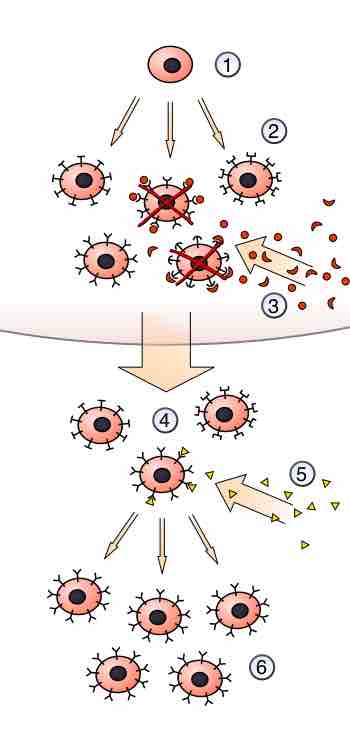Clonal selection is an theory that attempts to explain why lymphocytes are able to respond to so many different types of antigens. T and B cells are able to respond to nearly all of the world's vast variety of antigens upon presentation. Clonal selection assumes that lymphocytes are selected during antigen presentation because they already have receptors for that antigen.
Clonal Selection
In clonal selection, an antigen is presented to many circulating naive B and (via MHC) T cells, and the lymphocytes that match the antigen are selected to form both memory and effector clones of themselves. This mass production is termed "clonal expansion," in which daughter cells proliferate into several generations of clones of the original parent cells. The theoretical basis of clonal selection is the assumption that lymphocytes bearing an antigen receptor for an antigen exist long before antigen presentation occurs, explained by the idea of random mutations (VDJ recombination) that occur during lymphocyte maturation. During antigen presentation, pre-existing lymphocytes that bear that antigen receptor are merely selected because they can bind with that antigen. It is also assumed that most lymphocytes never encounter the antigen for which they bear a receptor.
Clonal selection may also be used during negative selection during T cell maturation. Here, the body's own epitopes are presented to the infant lymphocytes; those that react are recognized as auto-reactive and destroyed before they (and their future cloned daughter cells) can leave and wreak havoc in the body. This assumes that random mutations resulted in lymphocytes that were autoreactive instead of reactive to non-self antigens.
Following an adaptive immune response, memory cells are able to respond to a new infection of the same pathogen much more quickly than the original effector T cells during the formation of the adaptive immune response. Clonal selection is thought to cause mutations of antigen-binding affinity in memory cells during clonal expansion so that memory cells have greatly increased antigen-binding affinity than the effector cells during the first response. The increased binding affinity may be why memory cells can eliminate a pathogen more rapidly than the original generation of effector cells. This idea is still only a theory, but explains many of the nuances of the adaptive immune system.

Clonal selection of lymphocytes
A hematopoietic stem cell undergoes differentiation and genetic rearrangement to produce lymphocytes in the immune system. Clonal selection of lymphocytes: 1) A hematopoietic stem cell undergoes differentiation and genetic rearrangement to produce 2) immature lymphocytes with many different antigen receptors. Those that bind to 3) antigens from the body's own tissues are destroyed, while the rest mature into 4) inactive lymphocytes. Most of these will never encounter a matching 5) foreign antigen, but those that do are activated and produce 6) many clones of themselves.
T Cell Differentiation
Following T cell maturation, naive T cells circulate through the circulatory and lymphatic systems of the body until presented with an antigen for which they bear the receptor. T cells are sorted to be either helper, cytotoxic, or regulatory variants during maturation, but may differentiate into subsets following T cell activation. Following antigen presentation, the T cell is activated and begins to differentiate. T cell differentiation happens via the following steps:
- The activated T cell becomes a large blast cell.
- The blast cell proliferates by clonal expansion.
- Cloned daughter cells differentiate into either effector T cells or memory T cells.
- Cytotoxic effector T cells are finished, but helper T cells continue to differentiate into individual subsets of helper T cells.
Many different subsets of helper T cells perform various functions. The most common subsets are Th1, which mediates cyotoxic T cell activity through cytokine release, and Th2, which presents antigens to B cells. Additionally, Th17, which only differentiates from effector cells if certain cytokines are present, is important in regulating and inhibiting T-reg cell activity. The effector cells are short-lived for the duration of the adaptive immune response while memory cells are long-lived and are the basis of the secondary immune response.